Chamwe Kaira
Namibia does not owe money to airlines that operate in the country, records released by the International Air Transport Association (IATA) showed this week.
Kamil Alawadhi, Regional Vice-President Africa and Middle East of IATA disclosed that since 2018, a significant amount of blocked funds have been repatriated from Angola, Ethiopia, Ghana, Nigeria, and
Zimbabwe through working with the respective governments. Currently US$1.68 billion in airline funds remain blocked across the continent. IATA records showed that Namibia is not among countries blocking money owed to airlines.
Alawadhi, said achieving reasonable levels of taxes and charges by focusing governments on the long-term social and economic benefits of aviation. Infrastructure in Africa comes with a high price tag; user charges across the continent are 8 percent higher than the industry average.
“Infrastructure charges must be set at levels that are fair, justified, and reflective of a value service proposition for airlines and passengers. Efforts through a Pan-Africa fuel campaign have resulted in charges reductions in Chad, the Ivory Coast and Zambia over the last five years.”
Earlier this year, AFRAA joined IATA’s Focus Africa initiative. AFRAA is absolutely instrumental and strengthens the Focus Africa coalition as the continent work to increase aviation’s role in Africa’s development.
One of Focus Africa’s safety initiatives is CASIP, the Collaborative Aviation Safety Improvement Program with the objective to improve operational safety and to reduce the accident and serious incident rate across the continent of Africa.
Aaron Munetsi, CEO, Airlines Association of Southern Africa said aviation industry has been facing a raging fire through the myriad of challenges that the industry has had to deal with.
He said operating costs which in some cases account for as much as 40 percent of an airline’s costs.
He disclosed that airlines are faced with a critical shortage of spare parts for their aircraft and this shortage has resulted in some airlines being forced to discontinue utilisation of the affected aircraft because safety is non-negotiable.




